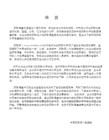三级语法(3)
- 格式:doc
- 大小:51.00 KB
- 文档页数:7

语法一.Conjunction (连词)表时间的连词1. 表同时进行when, while, as , the instant, the moment, the time, each time, every time…e.g : You see the lightening the instant it happens, but you hear the thunder later.注:while 和 as 有表示对比的意思While/As I am reading,he is listening to the music.2. 表时间先后after,before,not…until表示原因的连词as, because, so, in that(因为),since表条件的连词as long as (只要), if, unless,e.g.: As long as live, I will help you.Unless you take more care, you’ll have an accident.表让步(虽然…)的连词although, though, but, as,注:as 表让步时通常要用倒装e.g.: Yong as he is, he shows great potential.表示目的的连词in order that (为了),lest(以免,唯恐), in case (以防),for fear that (以免),所连接的从句常用虚拟语气即谓语动词用should或原形动词的形式I was afraid lest the new bike should be stolen.二.虚拟语气1. 条件句的虚拟语气表示与现在事实相反,if 从句的谓语动词用一般过去时,主句的谓语动词用should, would, could, might 等加动词原形。
I wouldn’t buy the book if I were you.表示与过去事实相反,if 从句的谓语动词用过去完成时,主句的谓语动词用should, would, could, might 等加动词完成时。

公共英语三级考试经典语法详解现在很多学生在幼儿园就接触过双语教学模式,英语的重要性可想而知。
或许英语已不再单单是一门学科,它已经成为必须掌握的一种语言。
下面是为大家搜索的xx年三级经典语法详解,希望能给大家带来帮助!更多精彩内容请及时关注我们!(1) 并列连词用来连接并列关系的词、短语或分句,如and, for, or, both…and, either…or, neither…nor等。
(2) 附属连词用来引导从句,如that, if, whether, when, after, as soon as等。
除了附属连词(引导状语从句)外,还有其它可以用来引导从句的词类。
它们是连接代词和连接副词(引导名词性从句),关系代词和关系副词(引导定语从句)。
(1)and 和,并且They drank and sang all night.(2) both…and 和,既…也…Both my parents and I went there.(3) but 但是,而I'm sad, but he is happy.(4) eithe r…or 或…或…,要么…要么…Either you're wrong, or I am.(5) for因为I asked him to stay, for I had something to tell him.(6) however 然而,可是Af first, he didn't want to go there. Later, however, he decided to go.(7) neither…nor 既不…也不Neither my parents nor my aunt agrees with you.(8) not only…but(also) 不但…而且…He not only sings well, but also dances well.(9) or 或者,否那么Hurry up, or you'll be late.Are you a worker or a doctor?(10) so 因此,所以It's getting late, so I must go.(11) although 虽然Although it was late, they went on working.(12) as soon as 一…就I'll tell him as soon as I see him.(13) because 因为He didn't go to school, because he was ill.(14)unless 除非,如果不I won't go unless it is fine tomorrow.(15)until 直到…He didn't leave until eleven. (瞬间动词用于not… until 构造)He stayed there until eleven.(16)while 当…时候,而 (表示比照)While I stayed there, I met a friend of mine. (while后不可用瞬间动词)My pen is red while his is blue.(17)for 因为He was ill, for he didn't e. (结论是推断出来的)(18)since自从…I have lived here since my uncle left.(19)hardly… when 一… 就I had hardly got to the station when the train left.(20)as far as 就… 来说As far as I know, that country is very small.You may walk as far as the lake. (一直走到湖那里)II. 例题例1 John plays football , if not better than, David.A as wellB as well asC so wellD so well as解析:该题意为:John踢足球如果不比David好的话,那也踢得和David一样好。

大学英语三级A级-词汇与语法(三)(总分:100.00,做题时间:90分钟)一、词汇与语法(总题数:100,分数:100.00)1.The son has almost been driven mad by his parents' (end) 1 complaints.(分数:1.00)填空项1:__________________ (正确答案:endless)解析:[答案精解] complaints前需要形容词作定语,end的形容词是通过在其后面加后缀-less构成的,所以为endless,意思是“没完没了的,永无休止的”。
2.The young boy had no friends there. His (lonely) 1 made him unhappy.(分数:1.00)填空项1:__________________ (正确答案:loneliness)解析:[答案精解] his后面需要一个名词做本句话的主语,lonely的名词是通过在其后面加后缀-ness变过来的,但lonely以辅音字母加y结尾,要把y变成i再加ness,所以为loneliness。
3.They took pains to promote the (cooperate) 1 between the two companies in developing a new product.(分数:1.00)填空项1:__________________ (正确答案:cooperation)解析:[答案精解] 动词promote后面需要名词作宾语,cooperate的名词为cooperation。
4.The chair looks rather unusual in shape, but it is very comfortable to sit ______.(分数:1.00)A.byB.on √C.withD.at解析:[答案精解] 本句意:这把椅子形状看上去比较怪,但坐上去却非常舒服。

三级语法重点第一章动词的时态一、一般现在式:* 1、表示经常发生的动作或存在的状态:常和always, usually, often ,sometimes, every day, every week的等时间状语连用。
例:He goes to work every day. 他每天去上班。
2、表示普遍的真理。
由于是众所周知的客观事实,所以一般不用时间状语。
例:The earth is round.一般时* 3、有些表示心理状态或感情的动词(如,be,think,fear,feel,hate,know,intend,like,live,love,realize,remain, understand)往往用一般现在时。
例:I don’t think you are wrong..我以为你错了。
时态* 4、在时间、条件状语从句中表示将来的动作即(代替将来时):条件状语从句常由as soon as,when,till,if, unless, suppose, in case, so long as来引导(即主句用将来时,从句用一般现在时,表将来)例题* (1)They will go home for winter vocation as soon as they________their exams.A. have finishedB. finishC. finishedD. was finishing(答案:B)(1996年22题)(2)When the mixture ______, it will give off a powerful force.A. will heatB. will be heatedC. is heatedD. has heated(答案:C)(1992年59题)第五* 5,某些表示起始的动词,可用一般现在时表示按规定、计划或安排要发生的动作,这类动词有:be,go,come,start,depart,arrive,begin,leave 等。


第一部分文型一、敬語敬语在两种情况下使用,一是在长辈面前或比自己身份地位高的人面前,二是,根据自己所属集团,分出「内」和「外」。
对长辈或上司,及「外」的人的动作用「尊敬語」,对这些人说自己或「内」的人的动作时用「謙譲語」。
A 尊敬語1 お+動詞のます形+になります(经常用于第一类动词,ます形只有一个假名的也不用)社長はすぐにおもどりになりますか。
(19993-7)2 お+動詞のます形+ください(てくださいの尊敬語,ます形只有一个假名的不用)どうぞこちらにおすわりください。
(20012-1)3 用动词的被动形式,来表示尊敬的意思おきゃくさまはどこにすわられますか。
(19992-12)4 お(ご)+動詞のます形+です(ます形只有一个假名的不用)先生は今お出かけですか。
部長は本日の会議にご欠席です。
5 特殊動詞中川さんががかいたえをごらんになりましたか。
(20013-3)B 謙譲語1 お(ご)+動詞のます形+し(いたし)ます注意:1,ます形只有一个假名的词不使用本句型、2,适用本句型的词必须是有动作接受方的词,如「説明する、連絡する、返事する、案内する、紹介する、招待する、相談する、電話する、約束する」等,而没有动作接受方的词,如「留学する」就不能用于此句型。
わたしのかさをお貸ししましょう。
(20012-3)わたしはこの自転車をご修理いたします。
2 特殊動詞社長は今電話に出ておりますので、しばらくお待ちください。
(20003-8)特殊動詞の例行く――いらっしゃる(尊敬)、参る(謙譲) いる――いらっしゃる(尊敬)、おる(謙譲)来る――いらっしゃる、おいでになる(尊敬)、参る(謙譲)言う――おっしゃる(尊敬)、申す(謙譲) する――なさいます(尊敬)、いたします(謙譲)見る――ご覧になる(尊敬)、拝見する(謙譲) 食べる――召し上がる(尊敬)、いただく(謙譲)知っている――ご存知です(尊敬)、存じております、存じません(謙譲)聞く――伺います(謙譲)C敬语与被动的区别区分方法:把句子还原,不影响意思表达得为敬语,影响的则为被动。
成人英语三级语法知识大全一、句法分析 (2)二、词法分析 (3)三、时态 (9)四、被动语态 (12)五、情态动词 (13)六、不定式 (15)七、定语从句 (18)八、主语从句 (23)九、表语从句 (24)十、宾语从句 (24)十一、同位语从句 (25)十二、状语从句 (26)十三、虚拟语气 (29)十四、动名词 (32)十五、现在分词 (32)十六、过去分词 (36)十七、独立主格结构 (38)十八、倒装句型 (39)十九、强调句型 (40)二十、主谓一致 (41)二十一、It的用法 (43)一、句法分析1、主语:是句子要说明的人或物,可以作主语的成分有名词,主语一般在句首。
注意名词单数形式常和冠词不分家!1) Mr. Lee is a well-known scientist.名词作主语2) He reads newspapers everyday.代词作主语3) Two and ten is twelve.数词作主语4) Smoking is harmful to the health.动名词作主语5) To swim in that pool is a great pleasure.动词不定式作主语6) What we shall do next is not yet decided.从句作主语2、谓语: 说明主语的动作,状态或特征1) The new term begins on the 1st of September.2) His father is an engineer.3) She seemed happy.4) Li Hua showed me his album.3、宾语:指的是及物动词涉及到的人或物1) Wang Ling lent me a novel to read in the bus.2) The medicine is good for a cold.3) How many pieces do you want?4) My little sister always likes to ask questions.5) Would you mind coming earlier tomorrow?6) He asked me what I was going to do tonight4、宾语补足语:在宾语后面补充说明宾语的动作、状态、特征。
公共英语(PETS)三级语法与词汇例题解析(三)41. _____ a pen, two books and a pencil-box on the desk.A. There haveB. There isC. There areD. There was答案:C解析:宾语为复数。
42. The students will put off the match u ntil next week, _____ they won’t be so busy.A. sinceB. asC. whenD. while答案:C解析:这是一个定语从句,when定的是逗号前的next week.43. She ought to go by plane, _____?A. wouldn’t sheB. shouldn’t sheC. should sheD. would she答案:B解析:ought to 的否定表示为shouldn’t。
44. So badly _____ in the accident that he had to be sent to hospital for treatment.A. did he injureB. injured he wasC. he was injuredD. was he injured答案:D解析:他在事故中受伤如此严重,所以被送往医院治疗了;注意以so开头的句子要倒装。
45. This test is for students _____ native language is not English.A. thatB. of whomC. whoseD. which答案:C解析:表达“什么的…”或“谁的…”时,用whose来引导;这句话的意思是:这次测试是针对那些本族语不是英语的学生的。
解析:改为:completely, 修饰后面的形容词bald, 副词修饰形容词.这句话是说,查利叔叔完全秃顶了,因此他喜欢走到哪儿都带着帽子。
三级语法(3)非谓语动词1.非谓语动词用作主语2.非谓语动词用作宾语3.非谓语动词用作定语4.非谓语动词用作状语5.非谓语动词用作宾补非谓语动词为英语自学考试中出题最多的题型,重点考查不定式,分词和动名词的句法功能。
下面就非谓语动词的用法作一简要概述。
【用作主语】非谓语动词能用作主语的只有不定式和动名词,它们在这一用法上略有区别:1. 表示抽象的概念时,可用不定式或动名词作主语;表示个别的,具体的动作或表示将来的意思时,只能用不定式作主语。
①To solve the problem is out of question. 解决这个问题不在话下。
(表示个别,具体的动作,不用动名词短语solving the problem作主语。
)②We can not accept this idea. To accept it means to give up our stand.我们不能接受这个观点,接受它就意味着放弃了我们自己的立场。
(To accept表示一种将来的含义。
)2. 1)不定式短语和动名词短语作主语时常用形式主语it引导。
有时两者可互用。
It is not easy to master (mastering) a foreign language. 掌握一门外语不容易。
2)但在It is no good/ use / help/ point/ sense …, 和There is no … 等句式中,一般用动名词,不可用不定式代替。
①There is no use crying over spilt milk. 牛奶撒了,哭也没有用。
②It is no good writing to him; he never answers letters.给他写信一点用也没有,他从不回信。
Is there any good trying to explain? 解释会有用吗3)不定式的复合结构常用“It + be + adj. + for + 代词宾格+不定式”的句式,其中不定式是真正的主语,代词宾格为它的逻辑主语。
①It is necessary for us to do some more practice. 我们必须多做一些练习。
②That is really kind of you to say so. 你这样说真是太好了。
(在口语中,如果形容词和逻辑主语的关系很密切,常用of代替for,组成习惯用法。
)【用作宾语】不定式和动名词均可用作宾语。
1. 一些动词要求用不定式作宾语,常见的有:afford, agree, ask, want, hope, decide, like, wish, try, learn, except, prefer, begin, help, offer, start, fail, plan, promise, refuse, 等动词。
I can not afford to buy a new car. 我买不起一辆新车。
2. 一些动词要求用动名词作宾语,常见的有:enjoy, finish, avoid, excuse, mind, suggest, practise, admit, appreciate, consider, deny, quit, risk, stop, miss, complete, escape, mention, favor等动词。
①He still did not admit stealing the diamond. 他仍然不承认偷了钻石。
②You should practise speaking English as much as possible. 你应该多练习说英语。
3. 有些动词后既可跟不定式又可跟动名词作宾语。
这有几种情况:1)如like, begin, start, want, love, hate, attempt, continue, intend, prefer等动词,跟不定式或动名词作宾语意思差别不太大。
一般说来,用动名词表示的是抽象的,时间不确定的动作;用不定式表示的是具体的,确切的动作。
①I like walking to school. 我喜欢步行去上学。
(表示一个总体抽象的概念)②I would like to walk to school today. 我今天想步行去上学。
(表示一个具体的,确切的动作)2) 有些动词,如stop, remember, forget, try, propose, mean, regret等,后接不定式和接动名词意思不同。
stop to do 停下来去做某事stop doing 停止做某事remember/forget to do 记得/忘了要去做某事remember/forget doing 记得/忘了做过某事try to do 努力,企图try doing 试一试某种方法regret to do 对尚未做或正在做的事表示遗憾regret doing 对做过的事表示后悔mean to do 打算做某事mean doing 意味着propose to do 打算做某事propose doing 建议做某事①I do not remember ever meeting that man. 我不记得见过那个人。
Please remember to phone me when you get there. 请到那儿之后给我打电话。
②I propose resting for half an hour. 我建议休息半个小时。
I propose to go to London this summer. 我打算夏天到伦敦去。
③I regret to tell you that you lost the game. 我非常遗憾地通知你,你输了。
3) 有些动词,如advise, admit, allow, authorize, bear, consider, like,encourage, forbid, intend, permit, recommend等,可同时用于“主语+ 动词+ 动名词”和“主语+ 动词+ 宾语+ 不定式”的结构中。
①They encouraged learning English by radio. 他们鼓励通过收音机学英语。
They encouraged me to learn English by radio. 他们鼓励我通过收音机学英语。
②She recommended visiting the Great Wall. 她推荐游览长城。
She recommended us to visit the Great Wall. 她建议我们游览长城。
4)need, want, require, deserve, demand, bear等动词后,跟不定式时,用被动形式表示被动含义;跟动名词时,用主动形式表被动含义。
注意:此时主语多为物。
This book deserves mentioning / to be mentioned. 这本书值得一提。
The room needs cleaning / to be cleaned. 屋子需要打扫了。
【用作定语】1. 不定式,动名词和分词都可作定语。
1)不定式作定语,一般后置,和它所修饰的名词在逻辑上存在着动宾关系。
因此,如不定式为不及物动词,需带相应的介词。
The subject I am going to write about is rather interesting.我正要写的这个题目十分有意思。
(write 后需加上介词about)2)动名词作定语相当于名词作定语,一般前置。
①a swimming pool 游泳池②reading material 阅读材料3)分词作定语相当于形容词作定语,单个分词作定语一般前置(但单个过去分词常后置),分词短语总是后置。
Matter is the name given to everything which has weight and occupies space.物质是一种名称,用来指任何一个有重量占空间的东西。
2. 分词与不定式作定语的区别:1)现在分词作定语表示事实,正在进行之事;不定式作定语表示目的,忠告,将要做之事。
2)分词作定语时,单个分词作定语一般前置(但单个过去分词常后置),分词短语总是后置;不定式作定语,一般后置,和它所修饰的名词在逻辑上存在着动宾关系或主谓关系。
①The next train to arrive was from New York.下一辆到站的列车是从纽约开来的。
(train和arrive构成主谓关系;to arrive是一种将来的动作。
)②I need a pen to write with. 我需要一只笔写字。
(pen和write构成主谓关系;介词with不可省。
)③He has too many things to do. 他要做的事情太多了。
(do和things构成动宾关系;to do是一种将来的动作。
)④A little child learning to walk often falls. 学走路的孩子常常摔跤。
(learning to walk表示一种正在进行之动作。
)⑤He wants his egg fried. 他要吃煎鸡蛋。
(fried为过去分词,后置,有一种被动的含义,等于to be fried)【用作状语】1. 不定式和分词都可用作状语。
1) 不定式作状语常用作目的状语,原因状语,结果状语,表示一种目的,结果,或者表示未来的动作。
分词作状语,可表示时间,原因,伴随状况,让步,条件,方式等。
2) 现在分词作状语表示一种主动。
过去分词作状语表示被动,并常用来说明动作发生的背景或情况。
①To become a teacher, it is necessary to have at least a master's degree. 要成为一名教师,至少必须得有硕士学位。
(不定式作目的状语,并表示一种未来的动作)②Arriving home at daybreak, he felt deadly tired. 他天亮了才到家,都快累死了。
(现在分词作时间状语)③We jumped with joy to hear the news. 听到那个消息,我们高兴得跳起来。
(不定式作原因状语)We jumped with joy on hearing the news. 听到那个消息,我们高兴得跳起来。
(现在分词作原因状语)④Absorbed in the work, he neglected food and sleep. 他专心致志于这项工作到了废寝忘食的地步。